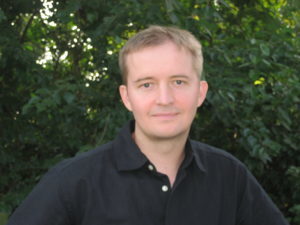
Original Curse
Contributor’s Marginalia: Aaron Baker on “Les Frelons” by Donald Platt
If I wrote about visiting my father’s grave on the afternoon after his funeral, the day after his burial, I would describe the snow on the headstones, the crunch of my footsteps in the gravel in of the walk. I would mention that it was April and that snow was unusual in Seattle this late in the year. I would describe how there were flowers on the rectangle of freshly turned dirt, but not remembering what they were, Google “funeral flowers” and choose a handful for their most interesting names.
__________
The speaker in Donald Platt’s poem “Les Frelons,” whether or not we assume him to be the poet himself, or a poet at all, struggles poignantly with one of the most essential and vexing predicaments of the poet—the malleability and unreliability of language. Pressed by an emergency of experience, here the illness of a loved one, Platt’s speaker’s use of language is unusually conscious of the distance between things and the names we give them, and that this might ultimately portend a failure to achieve control. In using the less familiar (to the speaker) French word for hornet, the poet attempts to achieve power over his object by naming it while simultaneously recognizing that no such direct power over experience is achieved by speaking.
Les Frelons have made their nest
in a hollow tree by the kitchen door. In much the same way rheumatoid arthritis
has taken up residence
in Dana’s joints, flares so her knuckles, toes, and knees swell.
__________
In my beginning poetry writing workshop, we talk about how poets, unlike scholars perhaps, may approach reading poems with highly idiosyncratic personal needs and obsessions having to do with their own memories and artistic ambitions. How a poet may bring to her reading a certain necessary selfishness.
__________
In Yeats’ “Lake Isle of Innisfree,” he imagines a return to a private Eden, where he will live alone in a bee-loud glade.
Eden. The original curse: enmity between the serpent and the fruit of Eve’s womb. Serpents have if anything my admiration, but I live in fear of stinging insects. Another graveyard. August in Bremen when I’m 17 years old and my mother has taken me to visit my great grandmother’s grave. I never knew my grandmother and and don’t presently recall her name. I’m stung by a bee on my leg in the churchyard and end up in the emergency room with swollen lips, a rash from by face to my navel, and struggling to breathe.
They fly from her hip sockets, they light
on her eyelids,
elbows and thighs. The becomes their host. They swarm over her,
colonizer her
until she’s hive humming. Her skin is all wings, I don’t
know what
to say anymore. Wherever I touch her, les frelons sting.
